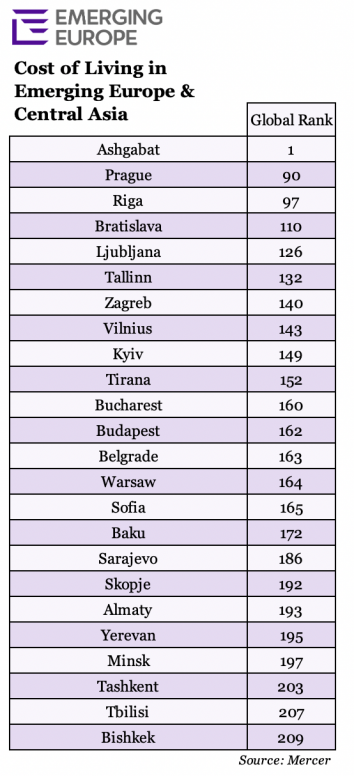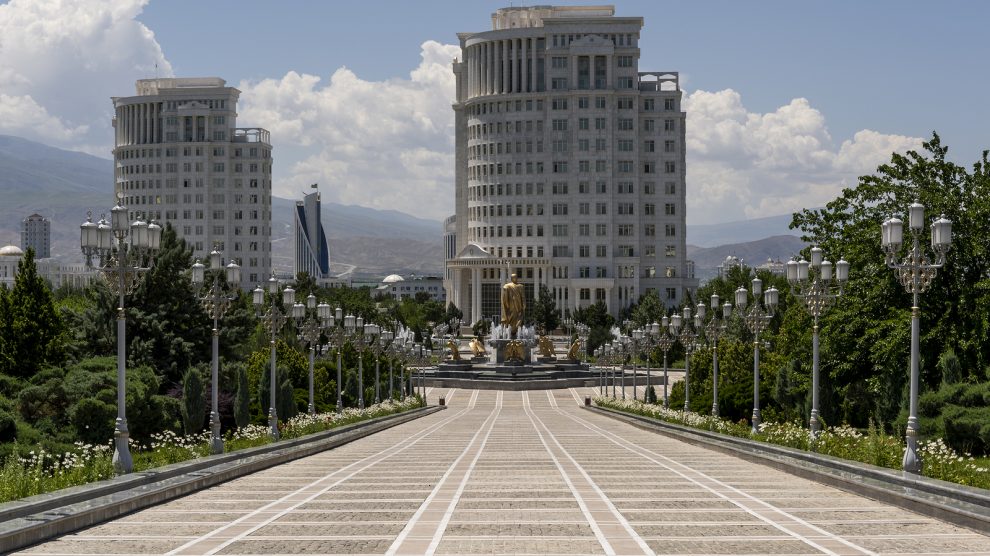Queues have been banned in parts of Turkmenistan as they “discredit” the country’s president. Officially, the country is Covid-19 free, reporting not a single case of the virus. But the economy is in tatters, and its capital Ashgabat is now the world’s most expensive city for foreign workers.
Ashgabat, the capital of Turkmenistan, is the most expensive city in the world for foreign workers, according to the latest edition of consultancy firm Mercer’s annual cost-of-living survey.
The Turkmen capital has taken top spot from Hong Kong, which falls to second place, ahead of Beirut in third.
Bishkek, the capital of Kyrgyzstan, is the cheapest city included in the survey.
- For Turkmen, rapping president Gurbanguly Berdymukhammedov is no joke
- Fudan Budapest is not the answer to Hungary’s higher education needs
- Beyond Borat: Five films from Kazakhstan and Central Asia
The report ranks 209 cities on the basis of costs such as housing, transport, food and entertainment and is used to help companies and governments determine how much they should pay foreign employees.
A city of around one million people, the cost of living in Ashgabat – whose name literally means “city of love” in modern Persian, and which is infamous for its many kitsch marble buildings that line eerily deserted streets – is currently high primarily due to runaway inflation, which is estimated at around 300 per cent.

Turkmenistan is rich in natural resources, home to around 10 per cent of the world’s total gas reserves, but low gas prices in recent years, as well as restrictions put in place to prevent the spread of the Covid-19 pandemic – which officials say does not exist in the country – have hit the country’s economy hard.
Hydrocarbons accounted for 94.6 per cent of the country’s exports in 2014, the last year the International Monetary Fund published such data. The World Bank, meanwhile, does not even bother featuring Turkmenistan in its biannual Global Economic Prospects survey, “due to a lack of reliable data of adequate quality”.
Turkmenistan is also absent from the World Bank’s Ease of Doing Business index. The European Bank for Reconstruction and Development (EBRD) meanwhile has branded the country “the least competitive economy among all EBRD’s countries of operations”.
A report by the London-based Foreign Policy Centre, says foreign governments and investors should stop investing in Turkmenistan, “a country teetering on the edge of catastrophe”.
Turkmenistan has long attracted investment from energy-hungry foreign governments, but – the report says – has a “Potemkin economy” as official GDP figures mask a chaotic financial system.
A ban on queues
In May, there were reports of officials in some cities banning queues outside state stores selling subsidised food after Deputy Prime Minister Serdar Berdymukhammedov, the son of authoritarian president Gurbanguly Berdymukhammedov, publicly said that “crowds near stores discredit” his father.
According to Human Rights Watch, Turkmenistan’s government denies the existence of poverty in the country and has failed to provide relief to economically vulnerable groups, even as unemployment has skyrocketed during the Covid-19 pandemic.
In the absence of any strategy to provide economic or social assistance, constraints on people’s access to affordable food mean that the government is failing to meet its international obligations to ensure an adequate standard of living and the right to food.
“Turkmenistan’s government has prioritised the country’s image over people’s well-being,” says Rachel Denber, deputy Europe and Central Asia director at Human Rights Watch. “With no effort to identify and assist the people most in need at this critical moment, Turkmenistan is callously neglecting the most basic norms of human rights, which include the right to food.”
Corruption meanwhile is endemic in Turkmenistan, with Transparency International ranking it 165th of 180 countries surveyed in its latest Corruption Perceptions Index.
Officially at least, Turkmenistan is one of very few countries in the world to have recorded no cases of Covid-19, although this is widely considered to be a lie.
President Berdymukhammedov recently told Moscow-based broadcaster Mir in a rare interview that “thanks to work (we) have carried out”, Turkmenistan has “yet to discover a case of this disease”.
There has, however, reportedly been a spike in cases of pneumonia, and Covid-19 restrictions are amongst the toughest in the world.
Earlier this month, the UCI, international cycling’s ruling body, was forced to cancel the World Track Cycling Championships, scheduled to be held in Ashgabat in October, citing “health constraints and restrictions linked to the Covid-19 pandemic which make it impossible to stage the event in Turkmenistan”.
Unlike many news and information platforms, Emerging Europe is free to read, and always will be. There is no paywall here. We are independent, not affiliated with nor representing any political party or business organisation. We want the very best for emerging Europe, nothing more, nothing less. Your support will help us continue to spread the word about this amazing region.
You can contribute here. Thank you.







Add Comment